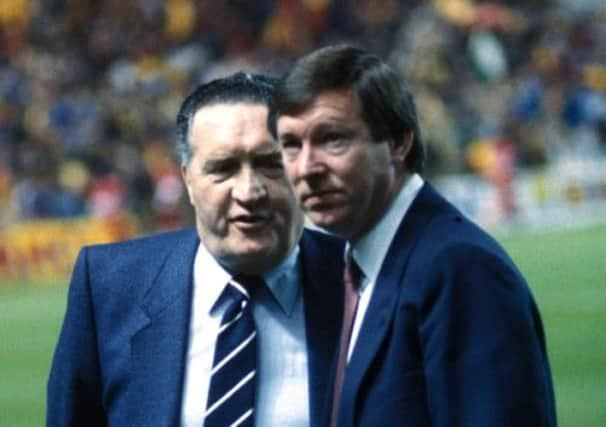Glenn Gibbons: Ferguson says Stein was the greatest


That is, the frequently bestowed acclaim of the Govan man as “the greatest manager in history”, an appendage which he himself believes, with a reverence that approaches sacredness, to be the rightful preserve of Jock Stein.
Even after almost 40 years of virtually unbroken distinction north and south of the border, Ferguson maintains that his happiest days as a manager were those he passed as Stein’s assistant with Scotland’s national team in the 1980s, once offering the startling confession that “I would have happily remained big Jock’s assistant for the rest of my days.”
Advertisement
Hide AdAdvertisement
Hide AdFerguson reflects many of the qualities the former Celtic manager brought to a profession in which he was an authentic pathfinder, not least an irresistibly forceful personality driven by a formidable intelligence and seemingly limitless energy. But he has always insisted that nobody, including himself, has come close to the natural charisma that made Stein the most seductive and persuasive figure of his lifetime. This is hardly surprising to those of us fortunate to have kept the company of both men through decades of incalculably rewarding relationships that brought immeasurable enrichment to the business of chronicling their staggering achievements. Both endowed with a capacity for ferocity (natural and contrived, depending on circumstances), they also had in common a mischievousness that was no respecter of status or reputation and a peerless judgment of character and talent.
Stein’s towering influence on those around him is fascinatingly illustrated by an episode that occurred during a Scotland trip abroad when Jim McLean was Stein’s assistant. Several younger managers, including Ferguson, were invited aboard by the SFA, an opportunity to observe and gain useful experience. On the first night, with Jock at the centre of the gang and debate and argument flowing, the big man silenced the gathering with a challenge: “Okay, here’s one for you,” he said. “What’s the difference between a good player and a bad player?”. That prompted a buzz of conversation and a series of analytical musings, to all of which Stein responded with a disapproving, “Naw, naw, you haven’t got it.” After a while, he surprised everyone by declaring that he was off to his room, leaving them to ponder and discuss the question.
The surprise sprang from the common knowledge that big Jock was a terrible sleeper, more likely to keep others out of bed than retire to his own. The following morning, Brian Scott, the Celtic and Scotland physiotherapist, was first at breakfast, as the medical men usually are, in order to make early fitness checks.
Stein was soon with him, asking Brian what had happened after he left and what the various “thinkers” had come up with. Scotty reported everything, eliciting from Stein another shake of the head. “Okay, what is the answer?” Brian blurted, by this time curious to distraction. “A good player,” said Stein, “sometimes gives a bad player a loan of the ball.” It is a story which exposes the essence of Stein, and not merely through the wit and conciseness of the definition of the distinction between the gifted and the mediocre. It was, much more tellingly, in his spearing of Scott for information, his singular method of intelligence gathering, leaving himself fully equipped in readiness to meet the others, already knowing what they had been thinking. This was a brilliant propensity for interrogation that made Stein virtually omniscient – and one of which Ferguson himself had first-hand experience. During a long conversation in his office at Carrington a few years ago, occasioned by my assignment to deliver a piece on Ferguson talking about his mentor, the Manchester United manager reminisced with undisguised delight on the times spent with Stein, including those occasions when he became one of the big man’s victims.
“When I was a player at Rangers,” said Ferguson, “Cathy and I would occasionally have a Saturday night dinner at the Beechwood, the pub/restaurant next to Hampden Park that was managed by Kenny Dalglish’s father-in-law, Pat Harkins. Jock and Sean Fallon, his assistant at Celtic, would take their wives there every weekend, as they both lived nearby in King’s Park. Well, any time Jock spoke to me, I would feel ten feet tall. It was magical. He would ask me how things were at Ibrox and I would tell him everything I knew. Utterly helpless, it just came out without my even realising it. That was the effect he had on people. It was no surprise that Jock kept Celtic ahead of us at that time. He knew everything that was happening at Rangers because I told him!
“Years later, when I was a fully-grown man, a manager at Aberdeen, winning major trophies, and his assistant with Scotland, it would still happen. He would give me a ring on a Friday night and simply say, ‘How you doing? What’s happening?’. And I would tell him everything that had happened that week. I would pour out everything, because I would think he already knew what was happening and if I didn’t fill him in, he would think I was holding out on him! That was the effect he had on people and it was no wonder he knew everything about everybody.”
It was, of course, Jock who recommended Ferguson to the late Chris Anderson, then vice-chairman of Aberdeen, as the replacement for Billy McNeill when the latter left Pittodrie to succeed Stein himself at Celtic in 1978. It would be enough in itself to warrant universal recognition of Jock as the soundest judge that ever drew breath.